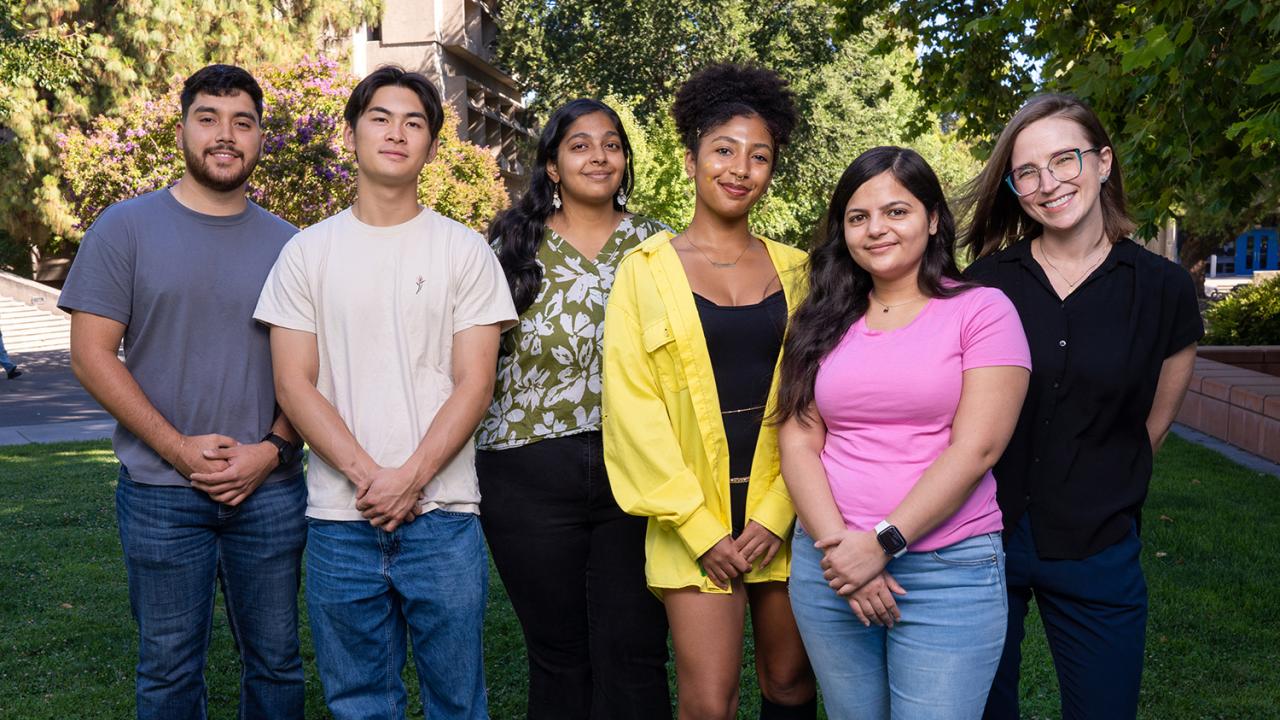
Brie Tripp Named 2024 Chancellor’s Fellow for Diversity, Equity and Inclusion
Fellowship Recognizes Excellence in Fostering Equitable and Inclusive Campus Environment
Brie Tripp, an assistant professor of teaching in the Department of Neurobiology, Physiology and Behavior is among this year’s cohort of five new Chancellor’s Fellows for Diversity, Equity and Inclusion. The prestigious fellowships reflect the campus priority of creating and maintaining a diverse, equitable and inclusive environment for all members of the UC Davis community.
“This fellowship recognizes exceptional contributions in supporting, tutoring, mentoring and advising underrepresented students, and students from underserved communities,” said UC Davis Chancellor Gary S. May in a letter to the recipients, honoring their “commitment to reducing opportunity gaps” for those students.
A passion for student engagement
From the time she was a student herself, Tripp noted the disparities in how students of color and those from underserved communities were represented in the classroom. It fed her own desire to make a more immediate difference. “I was doing wet bench science,” she says. “I felt isolated and removed from people. It helped me realize that what I really wanted to do was work with people.”
Tripp taught continually as a graduate student — even over the summer terms — and the experience of direct engagement with students helped her refocus her own trajectory. “I wanted to make the STEM environments, particularly STEM classrooms, more equitable and just,” she says.

Today, her research focus is married to her teaching, which emphasizes creating and implementing justice-centered curricula in the form of Social Justice in Science case studies. The studies involve collaborating with undergraduate researchers and local community partners to develop cases focused on the physiological challenges of groups experiencing health disparities, and ways to advocate for change. This provides students with the opportunity to grow their critical consciousness—an understanding and critique of systems of oppression and ways to collectively act in support of those most affected by healthcare injustice. “Our case study research is really at the heart of our lab and has provided a platform to grow my own critical consciousness, which I’m then able to model in my classes," says Tripp.
One way Tripp does this is to provide her students the chance to weigh in at the end of each lecture on what was especially meaningful, what left them curious and what points needed additional clarification. “I use their feedback to tailor my next lecture,” she says. “It helps the students get the most out of each class and has helps me grow as an instructor.”
Another innovative supplement to Tripp’s courses are “Scientist Spotlights,” which allow students to engage directly with assignments that feature a researcher from an underrepresented or marginalized group.
“Students read the biography of a scientist from a non-stereotypical background — maybe they’re transgender, or of color, or from another marginalized group — who is doing research within a STEM field,” explains Tripp. Each spotlighted scientist is coupled with the course’s content. “So, if we're learning about the cardiovascular system, we might look at a cardiologist, or someone who does cardiac research.”
From there, the students study the researcher’s work and make connections to the course content. The ultimate goal, explains Tripp, is to help each student reimagine who does science and build their own scientific identity.
“I’m really trying to increase the relatability of science,” says Tripp. “Especially for students from underrepresented or underserved backgrounds.” Findings from two classes that included spotlights indicated the experience had a marked impact on each student’s belief in themselves as a potential future researcher.
Tripp, who joined the department in 2021, knows firsthand how important an instructor can be to students, and to how they see themselves. “I actually started college as an English major,” she said. “Then I took an intro bio for non-majors course and it all changed. The instructor completely opened up my eyes in ways that no other instructor had. She made me believe that I could do science and completely changed my entire career trajectory.”
Now Tripp is doing the same for her students.
For her outstanding efforts in the classroom, Tripp was described by the fellowship committee as follows: “Professor Tripp seeks to promote social and racial justice in undergraduate science classrooms, both through teaching and research. In her courses, she implemented assignments and interventions designed to increase students’ sense of belonging, relatedness to science, and critical consciousness. Her outstanding mentoring efforts include serving on Avenue B faculty panels and developing curricula focused on critical action and experiential learning, facilitating authentic partnerships between students and their local communities.”
The 2024 cohort
The five recipients, as named by Chancellor Gary S. May and the Academic Senate Committee on Diversity, Equity and Inclusion, are:
- Miquell Miller, School of Medicine
- Glaucia Helena Carvalho do Prado, College of Engineering
- Danielle S. Stolzenberg, College of Letters and Sciences
- Brie Tripp, College of Biological Sciences
- Alia Tuqan, School of Medicine
About the fellowship
The UC Davis Chancellor's Fellowship for Diversity, Equity, and Inclusion is a prestigious award recognizing faculty members who have demonstrated outstanding commitment to fostering a diverse, equitable, and inclusive environment within the university community. The fellowship supports their continued work and acknowledges their significant contributions to creating a welcoming and inclusive campus culture. Recipients each receive $5,000 in one-time Academic Enrichment Funding.
